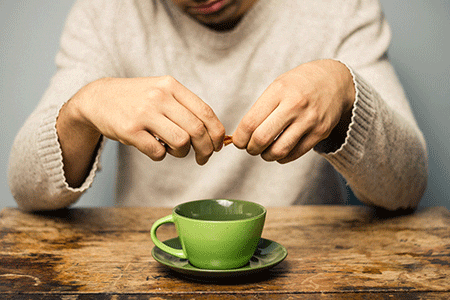People with diabetes need to limit their intake of sugar, fructose and high-fructose corn syrup to avoid blood sugar spikes, weight gain and related health conditions. Alternative sweeteners start to look like a sweet option for people with diabetes but that may not always be the case. Let’s compare 3 commonly used artificial sweeteners – aspartame, Stevia and Nectresse.
- People with diabetes should reduce their intake of sugar and high fructose corn syrup to avoid blood sugar highs. You still may crave a sweet treat now and again. For many people with diabetes, artificial sweeteners do not cause the blood sugar spikes associated with actual sugar. They also contain reduced calories. Most artificial sweeteners fall into one of four categories: dietary supplements, sugar alcohols, natural sweeteners and artificial sweeteners. Three of the most commonly used artificial sweeteners are aspartame, Stevia and Nectresse.
- Artificial sweeteners can often be the solution to your desire for a sweet taste. Natural sweeteners which are less processed still have the same impact on your blood glucose levels as regular white table sugar. Such sweeteners may include agave, honey, brown sugar, molasses and brown sugar substitute. Natural sweeteners should be used only sparingly to avoid blood sugar spikes and eliminated when blood sugars are out of control. They contain more calories and carbohydrates than artificial sweeteners.
- Aspartame is an artificial sweetener commonly sold under brand names such as Equal, NutraSweet and Sugar Twin. It is nearly 200 times sweeter than sugar. It is broken down by the body into its two component amino acids – phenylalanine and aspartic acid along with trace amounts of wood alcohol or methanol. Aspartame only contains 4 calories per gram. Aspartame is not safe for those with the metabolic disorder phenylketonura (PKU) as these people cannot process the amino acid phenylalanine. It can be used for baking but tends to lose its sweetness. Some people find aspartame has an aftertaste. Additionally, researchers found aspartame caused leukemia, lymphomas, kidney and other cancers in mice. It may also cause headaches and other neurological symptoms in a small number of people. You need to use your own judgment and talk to a dietitian about artificial sweetener use.
- Known as a dietary supplement, Stevia is virtually calorie-free and is also 200 times sweeter than sugar. For centuries, people in South America have used Stevia as a sweetener. Pure Stevia is not approved by the U.S. FDA because of animal studies that link it to a negative impact on fertility and potential genetic mutations. In 2008, the makers of Pure Via and Truvia were granted generally recognized as safe (GRAS) status by the FDA for the purified extract of Stevia known as rebaudioside A or Rebiana. Stevia is derived from a plant. Pure Stevia can be found at a vitamin shop or health food store. Products such as Pure Via, Truvia, Sun Crystals and Sweet Leaf are available at your local supermarket. Stevia can be used for baking but may have a slight vanilla aftertaste.
- Another dietary supplement that is 200 times sweeter than sugar is monk fruit. This is an ancient Chinese fruit used to make Nectresse. This product closely resembles sugar and received FDA GRAS in 2009. Nectresse is a blend of monk fruit, erythritol, molasses and sugar. It can be used for baking but produces cake that is dry.
- Researchers have found an interesting link between weight gain and the use of artificial sweeteners. While they may have no or low calories, they increase our food cravings and may cause us to eat more. They also reinforce the need for a sweet taste. They are best to use occasionally rather than habitually. There is no substitute for a healthy diet and regular exercise.
While artificial sweeteners might seem to get the green light for people with diabetes, they should be using sparingly and with caution. The occasional use of an artificial sweetener to ward off sugar cravings can be helpful. Keep in mind your best choices are natural foods such as fruits and vegetables, low-fat dairy products, whole grains and lean meats, fish and poultry.













Leave A Comment